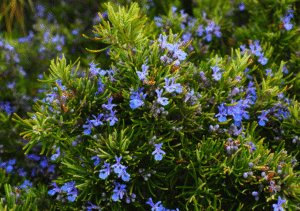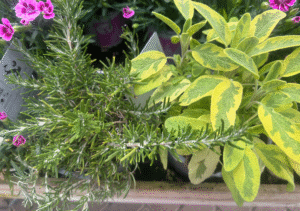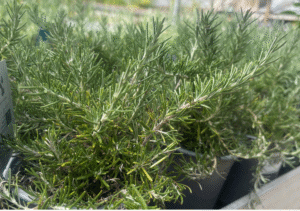
In the garden, rosemary makes an excellent border plant, filling in gaps with its dense, bushy growth. Trailing varieties are perfect for adding interest to walls or banks, offering both beauty and practicality. Its decorative appeal is matched by its hardiness, making it a fantastic choice for both traditional and contemporary garden designs.
When it comes to the kitchen, rosemary pairs especially well with lamb, roast potatoes, and even cocktails – making it a must-have for any home cook or mixologist. Its robust flavour enhances a wide variety of dishes, and a fresh sprig adds instant elegance as a garnish. During its flowering season, rosemary produces stunning spires of blue flowers that are not only highly aromatic but also a magnet for bees and other pollinators – a real boost for garden biodiversity!
Did You Know? Rosemary Is Now Classified as a Sage!
In a fascinating botanical update, rosemary has been officially reclassified from Rosmarinus officinalis to Salvia rosmarinus. This change reflects new scientific findings that reveal rosemary’s DNA is more closely related to sage (Salvia) than previously thought!
Growing Rosemary in the UK
Rosemary thrives in warm, sunny conditions, making it an excellent choice for a wide range of UK gardens. It grows particularly well in sheltered, south-facing areas, and can be planted in borders, containers, or even a low-growing hedge! With the right care, rosemary will reward you with aromatic foliage and attractive blooms year-round.
Climate & Hardiness
Rosemary naturally favours a Mediterranean-style climate with mild winters and dry, warm summers. Fortunately, it is hardy throughout most of the UK, tolerating temperatures as low as -10°C to -15°C once established. In regions that see heavy rainfall or prolonged frosts, it’s best to grow rosemary in a pot or container, allowing you to move it to shelter when needed.
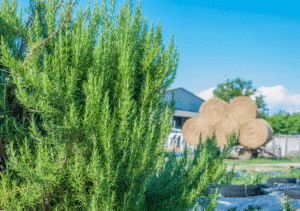
Soil Requirements
This aromatic herb thrives in light, well-drained soils. Avoid heavy clay or areas prone to waterlogging, as rosemary is susceptible to root rot. It prefers neutral to slightly alkaline soil with a pH between 6.5 and 7.5. Our hardy plants manager, Paul, recommends: “If your soil is too acidic, consider adding garden lime to improve conditions for rosemary to grow well.”
For the best growth and highest essential oil production, plant rosemary in full sun. While it can tolerate partial shade, it will perform far better in a spot that receives at least 6–8 hours of direct sunlight per day.
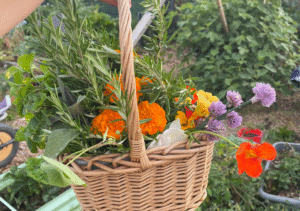
Is Rosemary easy to grow?
Yes, rosemary is relatively easy to grow, making it a very popular herb for UK gardeners of all experience levels. With little maintenance needed & the correct conditions, rosemary can thrive in pots, garden beds or even as a shrub.
Propagation
Rosemary can be grown a variety of different methods, from seeds, cuttings or young transplants, however each method will vary in ease and success rate:
- Seeds: While rosemary seeds are slow to germinate, they can be started indoors in the late winter or the early spring. Use a propagator or place on a warm windowsill to aid the growing process
- Cuttings: Taking softwoord cuttings in late spring or early summer is the most reliable and quicker method. Snip around 10cm length of a health stem, strip the lower leaves & place in moist, well-drained compost or water until roots start to develop
- Transplants: Purchasing young rosemary plants is a fuss-free way to get started and ideal for immediate results!
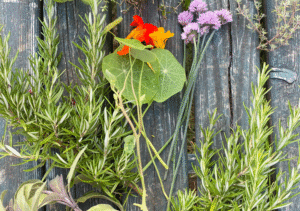
Planting
The best time to plant rosemary outdoors is in the spring (around April-May), once the risk of frost has passed. In the South West, if it’s still warm, you can also get away with planting early Autumn to establish before winter! Space rosemary plants about 45 – 60cm apart to allow airflow and space to grow & plant at the same depth as the root ball – burying the stem too deeply can lead to stem rot, stunted growth or plant failure. If planting in a container or indoors, you can start rosemary under cover earlier in the year for a head start.
Winter Care
Rosemary can be generally hardy in much of the UK, tolerating temperatures down to -10c to -15c once mature. It can also benefit from growing in a pot or container, for ease of movement, protecting roots with mulch or fleece during hard frosts or positioning in a sheltered, sunny spot to avoid wind and excess moisture.
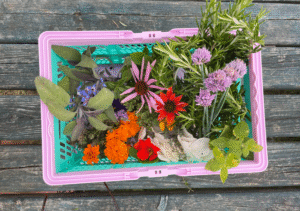
Pruning & Harvesting
Light pruning in the spring or after flowering helps maintain the shape of rosemary and encourages bushier growth. Avoid heavy pruning in to old wood, as it may prevent new growth.
You can harvest rosemary year round, but for the strongest flavour, pick in the morning during the growing season. Snip stems from the top, leaving enough foliage to support growth.
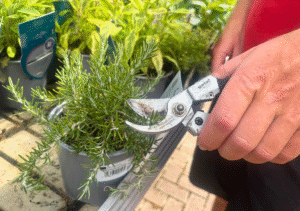
Storage
Depending on how long you’d like your rosemary to last, there are a variety of different ways you can store it.
Fresh harvested rosemary can be kept in the fridge, wrapped in a damp paper towel & stored in a bag or airtight container which will keep for 7-10 days.
If you’d like to keep your rosemary for a little bit longer, you can tie your sprigs in to small bunches and hang upside down in a cool, dry, and well-ventilated area; this process will take 10-14 days, then you can store in an airtight container after stripping the leaves from the stems.
You can also freeze your rosemary in ice cube trays with a little water or olive oil, keeping it in perfect condition before adding straight into soups or stews!
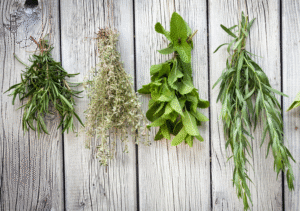
Why Grow Rosemary? Fragrance, Flavour, and Garden-Friendly Benefits
Rosemary is drought-tolerant and easy going once established, with its spires of blue flowers proving a firm favourite amongst pollinators like bees and other beneficial insects. It can enhance some of your favourite dishes like lamb, or be baked into pastries & breads – rosemary especially shines in a focaccia! On top of being a pleasant herbal scent in your garden or patio, rosemary can also make an attractive border plant, low hedge or container feature!
Whether you’re planting a herb garden, sprucing up a border, or looking to expand your culinary repertoire, rosemary is a brilliant all-rounder that thrives in a range of conditions!

